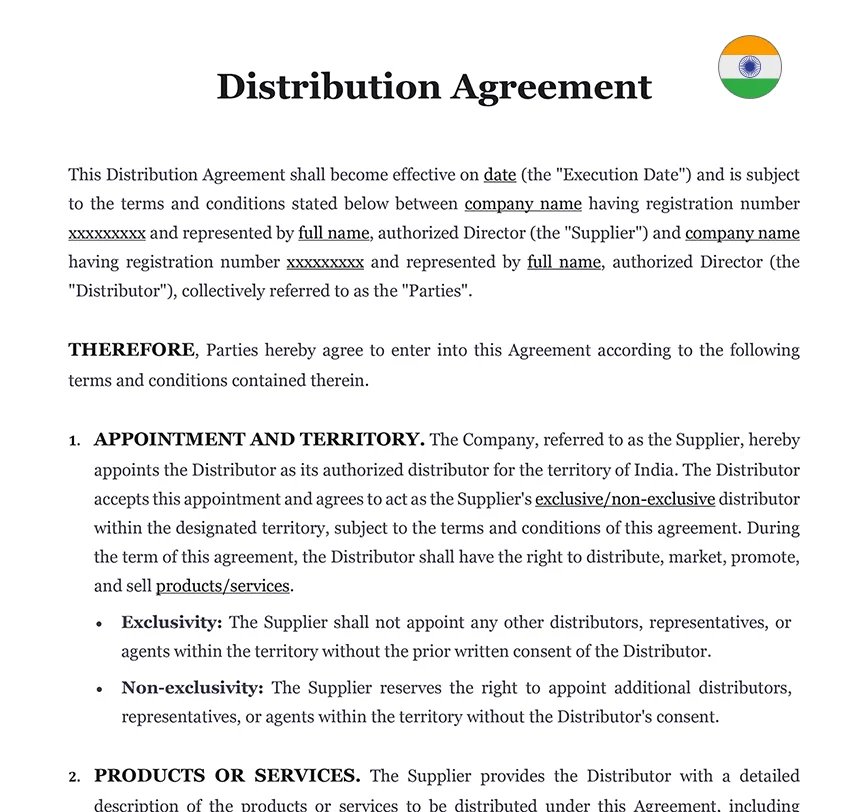Ready to use legal template
Drafted by experienced lawyers
Compliant with Indian law
Ready to use legal template
Drafted by lawyers
Compliant with Indian law
Home › Business contracts › Distribution Agreement
Learn more about Distribution Agreement in India
A distribution agreement is a contract between a supplier and a distributor, defining the terms for selling or promoting products and services. It covers aspects such as the products and services involved, geographic territory, exclusivity rights, pricing, payment terms, marketing activities, intellectual property, and termination conditions. The agreement facilitates a clear understanding between the parties, ensuring efficient distribution while minimizing disputes. We provide you with an easy to edit word format Distribution Agreement template which has been specially drafted by lawyers for use in India in accordance with local laws and regulations.
Table of contents
-
Why using a Distribution Agreement in India?
-
What should be included in a Distribution Contract?
-
What is the difference between Supply and Distribution Agreement?
-
When do you need a Distribution Contract?
-
How to terminate a Distribution Agreement in India?
-
What if I don’t have a Distribution contract?
Why using a Distribution Agreement in India?
Establishing Clear Expectations
One of the primary purposes of a distribution agreement is to establish clear expectations between the supplier and distributor. By defining the roles, responsibilities, and obligations of each party, the agreement ensures that both parties are on the same page regarding their respective contributions to the distribution process. This clarity minimizes misunderstandings, fosters effective communication, and promotes a harmonious working relationship.
Protecting the Interests of Both Parties
Distribution agreements serve as a means to protect the interests of both the supplier and the distributor. These agreements typically address important aspects such as pricing, payment terms, minimum order quantities, and delivery schedules. By including these details in the contract, both parties are safeguarded from potential disputes or ambiguities that may arise during the course of the distribution relationship. The agreement acts as a legal document to resolve conflicts and provides a framework for fair and transparent business practices.
Ensuring Intellectual Property Rights
In the context of distribution agreements, protecting intellectual property rights is crucial. Suppliers invest significant time, effort, and resources into developing unique products or services. Distribution agreements include provisions that clearly outline the ownership and permitted use of intellectual property associated with the products being distributed. This ensures that the supplier’s proprietary assets, such as trademarks, copyrights, or patents, are respected and properly utilized by the distributor, preventing unauthorized use or infringement.
Expanding Market Reach
Distribution agreements serve as powerful tools for market expansion. By entering into a partnership with a distributor, suppliers gain access to the distributor’s established network, expertise, and customer base. This allows suppliers to reach new markets and customers that may have been previously inaccessible. The distribution agreement defines the geographical territories in which the distributor has the exclusive rights to sell or promote the products, enabling suppliers to tap into untapped markets and expand their market share.
Facilitating Effective Marketing and Promotion
Another crucial purpose of a distribution agreement is to facilitate effective marketing and promotion of the products or services. The agreement specifies the marketing responsibilities of the distributor, including advertising, branding, and promotional activities. By aligning marketing efforts with the agreed-upon strategies, suppliers can benefit from the distributor’s expertise and resources in promoting the products effectively. This collaborative approach enhances product visibility, brand recognition, and ultimately drives sales.
Providing a Structured Framework for Termination
Distribution agreements also address termination conditions and dispute resolution mechanisms. While both parties enter into the agreement with the intent of a long-term, successful partnership, circumstances may arise that necessitate termination. The agreement defines the conditions under which termination is possible, protecting the interests of both parties. Additionally, the contract outlines dispute resolution procedures, providing a structured and fair process for addressing conflicts should they occur.
What should be included in a Distribution Contract?
1. Scope of the Agreement
The scope clause defines the products or services covered by the agreement, including specific details such as product specifications, variations, and any limitations or exclusions. This clause ensures a clear understanding of the scope of the distribution relationship and helps prevent potential disputes regarding the products or services being distributed.
2. Territory and Exclusivity
The territory clause establishes the geographic area where the distributor has the exclusive rights to sell or promote the products or services. It defines the boundaries within which the distributor operates and ensures that no other distributor or the supplier’s own sales team competes within the designated territory. Clearly defining the territory and exclusivity rights helps protect the distributor’s market share and prevents market cannibalization.
3. Pricing and Payment Terms
The pricing and payment terms clause outlines the agreed-upon pricing structure for the products or services, including any discounts, rebates, or incentives. It also specifies the payment terms, such as payment due dates, accepted payment methods, and any penalties or interest for late payments. This clause ensures transparency in pricing and establishes a clear framework for financial transactions between the supplier and distributor.
4. Minimum Order Quantities and Sales Targets
Including a clause regarding minimum order quantities and sales targets helps establish performance expectations for the distributor. This clause specifies the minimum quantity of products that the distributor must order within a certain period and sets sales targets to drive revenue growth. Defining these metrics ensures that both parties have a shared understanding of the distributor’s obligations and encourages proactive sales efforts.
5. Intellectual Property Rights
The intellectual property rights clause addresses issues related to trademarks, copyrights, patents, and other intellectual property associated with the products or services being distributed. It clarifies the ownership, permitted use, and protection of intellectual property assets, ensuring compliance with relevant laws and preventing unauthorized use or infringement.
6. Marketing and Promotion
The marketing and promotion clause outlines the marketing responsibilities of the distributor, including advertising, branding, and promotional activities. It may specify the marketing budget, the approval process for marketing materials, and the use of the supplier’s trademarks or logos. This clause ensures that both parties are aligned in their marketing efforts, maximizing product visibility, and driving brand awareness.
7. Termination and Dispute Resolution
The termination clause defines the conditions under which either party can terminate the distribution agreement, including breach of contract, non-performance, or insolvency. It also outlines the procedures for dispute resolution, such as negotiation, mediation, or arbitration. Including these provisions provides a structured framework for addressing potential conflicts and protecting the interests of both parties.
What is the difference between Supply and Distribution Agreement?
The main difference between a Supply Agreement and a Distribution Agreement lies in the focus and parties involved.
• Supply Agreement: It typically involves a supplier and a buyer. The agreement focuses on the sale and purchase of goods between them, specifying terms such as pricing, quantity, quality, and delivery.
• Distribution Agreement: It involves a supplier, a distributor, and end customers. The agreement focuses on the distribution and sale of products to end customers. It outlines terms related to marketing, promotion, territory, and customer support.
In summary, a Supply Agreement centers around the purchase of goods between a supplier and a buyer, while a Distribution Agreement focuses on the distribution process involving a supplier, distributor, and end customers.
When do you need a Distribution Contract?
A Distribution Contract is needed when a supplier wants to establish a formal relationship with a distributor for the sale and distribution of its products. It is required to define the terms, obligations, and rights of both parties, protect intellectual property, establish territorial boundaries, and provide a structured framework for the distribution arrangement. The contract offers legal protection, ensures clarity, and establishes the responsibilities of each party, making it essential when entering into a distribution partnership.
How to terminate a Distribution Agreement in India?
To stop a distribution agreement, the following steps can be taken:
1. Review the Distribution Agreement: Carefully review the distribution agreement to understand the termination provisions, notice requirements, and any other relevant clauses pertaining to the termination process. This will help ensure compliance with the agreement and determine the necessary steps for termination.
2. Identify Grounds for Termination: Identify the valid grounds for termination as specified in the distribution agreement. These grounds typically include breaches of contract, non-performance, insolvency, or any other mutually agreed-upon reasons for termination. Ensure that there is a valid reason for termination based on the terms outlined in the agreement.
3. Provide Written Notice: As per the notice provisions in the distribution agreement, provide a written notice of termination to the other party. Clearly state the intention to terminate the agreement, specify the effective date of termination, and cite the grounds for termination. Adhere to any specific notice periods mentioned in the agreement.
4. Follow Dispute Resolution Procedures: If a dispute arises during the termination process, follow the dispute resolution procedures outlined in the distribution agreement. This may involve negotiation, mediation, or arbitration, depending on the agreed-upon methods for resolving conflicts. Engaging in these procedures can help resolve any disagreements and facilitate a smoother termination process.
5. Wind Down Operations: Coordinate with the distributor to wind down operations smoothly. This may involve returning unsold inventory, transferring customer accounts, or assisting with the transition to a new distribution arrangement. Maintain open communication and cooperate to minimize disruptions to customers and ensure a seamless transition.Remember, the termination process should be conducted in accordance with the terms and conditions stipulated in the distribution agreement. It is crucial to act in good faith and maintain professionalism throughout the process to preserve business relationships and minimize any potential legal implications.
What if I don’t have a Distribution contract?
If you don’t have a Distribution Contract in place, the termination process may be less formalized, but it is still essential to approach the termination in a professional and fair manner. Without a contract, it is advisable to engage in open communication with the distributor and mutually agree on the terms of termination, including the notice period, inventory returns, and any other relevant considerations. While the absence of a contract may make the process less structured, it is important to ensure that the termination is conducted in good faith and in compliance with applicable laws and regulations. Seeking legal advice can provide guidance on how to navigate the termination process without a formal contract.
Distribution AgreementTemplate (.docx)
Save on attorney fees
310 client reviews (4.8/5) ⭐⭐⭐⭐⭐
Share information
Why Themis Partner ?
Make documents forhundreds of purposes
Hundreds of documents
Instant access to our entire library of documents for India.
24/7 legal support
Free legal advice from our network of qualified lawyers.
Easily customized
Editable Word documents, unlimited revisions and copies.
Legal and Reliable
Documents written by lawyers that you can use with confidence.




